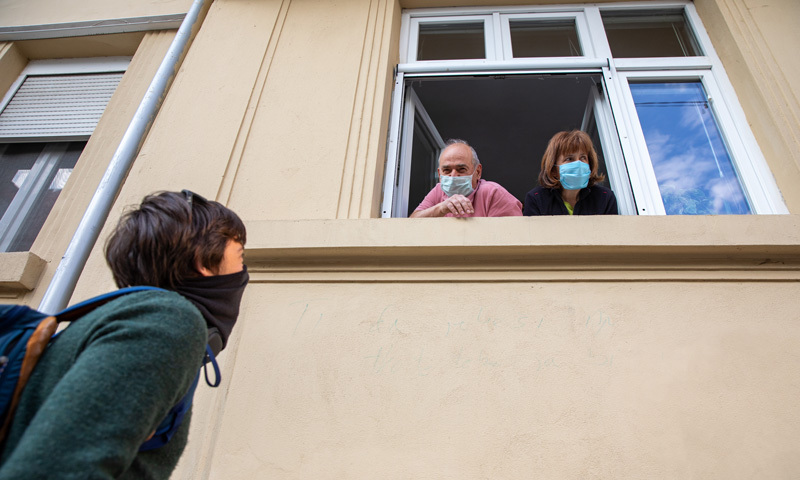News
How Efficient Were Coronavirus Lockdowns?
[26.07.2021]Lockdowns were more effective in countries with good healthcare systems. This is the conclusion of a study by a team of researchers at the FernUniversität in Hagen.
 Photo: VichoT/Getty Images
Photo: VichoT/Getty Images
In the middle of this summer, the number of coronavirus cases in Germany remains low. In the middle of the same summer, a fifth wave has hit Spain. While England has lifted its mask requirement despite rising infection numbers, Sweden has never required masks – and still has fewer infections. It has long been proven that implementing coronavirus measures early has an effect on reducing case numbers. But how strict must these measures be in order to work?
“Lockdowns are overall an effective means of fighting the pandemic,” said Prof. Dr. Hans-Jörg Schmerer. The holder of the Chair of International Economics has published an extensive study on the efficiency of coronavirus lockdowns. His co-authors were his research associate Antonia Reinecke and Jaqueline Hansen (University of Tübingen). Together they analyzed data from 142 countries since the beginning of the pandemic in March 2020.
Transnational Study
“The coronavirus pandemic had the positive effect that quite a lot of data was made available for research,” said Antonia Reinecke, who recently completed her doctoral thesis at the chair. Many countries publish the lockdown measures they have imposed, such as school closures, mandatory work from home, or curfews, on a near-daily basis, including whether they have tightened or relaxed the rules. As a result, the research team was able to dive into a large data pool to investigate the impact of lockdowns.
 Photo: Hardy Welsch
Photo: Hardy Welsch
A stricter but shorter lockdown would have been better for the economy and the health of the population than the complicated set of rules with many exceptions that was introduced instead.
Prof. Hans-Jörg Schmerer
Based on this data, the researchers examined how the regulations that were in place affected the number of deaths in each country. Why deaths? “Because the number of deaths is more reliable from a research perspective than the number of infections,” Jaqueline Hansen explained. “The infection numbers are very dependent on the testing strategy of the country in question, and especially in developing countries we are dealing with a high number of unreported cases.”
In comparing the countries, the research team noticed that some countries like Italy or China had to impose severe measures in order to reduce infection numbers, while other countries like Sweden or South Korea weathered the crisis well with much less stringent measures. “It seemed increasingly plausible to us that there must be additional factors influencing the coronavirus death rate,” Antonia Reinecke remembered. So the researchers put the state of the health care systems under a microscope.
The Health Care System Tips the Scales
This is when a conspicuous connection became apparent for the first time. “The better a country’s health care system is, the more efficient the lockdown was, and thus, the fewer people died,” Prof. Schmerer summarized the main result of his study. The researcher attributes this effect to better health care services arising from higher per-capita health care expenditures. “Countries that spend more on health care as a rule also have better contact tracing, a better testing strategy, and better emergency care.” According to the study, a good health care system can even successfully compensate for weak lockdown measures. “But on the other hand,” Antonia Reinecke added, “this route is dangerous for the health of the population.”
 Photo: FernUniversität/Petra Pérez
Photo: FernUniversität/Petra Pérez
Germany is among the countries that spend the most on their population’s health care. In concrete terms, this means that less than ten percent of the 142 economies studied had equal or higher per-capita health care expenditures. These included Norway, Luxembourg, and Sweden, for example. However, a look at individual country categories also showed the researchers that the effects of a weak lockdown can completely evaporate in countries with poor health care systems. This is the case in developing countries, for example. Overall, the researchers are certain that a country is significantly better off with a short and stringent lockdown.
Do Not Only Look at Incidence Rates
The study delivers important findings about the role that the health care system plays in fighting the pandemic. It shows that a lockdown is only effective if the health care system is well-financed. And it confirms that decisions about a lockdown should not be tied to single key figures. For Schmerer, the lesson of the pandemic is thus clear: “The overly strong focus on a specific key figure, in my opinion, speaks to a certain loss of control on the part of political decision makers, who in some cases acted far too slowly. A stricter but shorter lockdown would have been better for the economy and the health of the population than the complicated set of rules with many exceptions that was implemented instead.”
The study “Health Expenditures and the Effectiveness of Covid-19 Prevention in International Comparison” was published in the CESifo Network’s working paper series.

